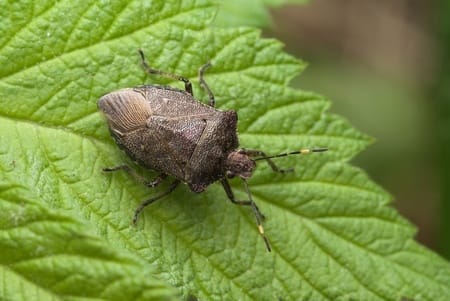Insect Problems in North Florida
Many North Florida homeowners do not want to lose any of their beautiful St Augustine grass to Lawn Pests; such as insects and worms which are very common throughout Central Florida. They can leave your lawn looking brown, or full of holes and in some cases, permanently kill all the grass or leave large bare spots in your lawn. The most challenging to get rid of and keep away from your beautiful yard are mole crickets, chinch bugs and sod webworms. Here we will discuss how to identify these pesky creatures, as well as how to rid them from your beautiful Florida yard. These are insect problems in North Florida.
Mole Crickets
These insects can be recognized by their gray-brown, velvety bodies and wide spade-like front legs, which are well adapted for digging. Adult mole crickets are about an inch to inch and a quarter in length with wings. The nymphs, or immature mole crickets, are similar looking but are smaller and have no wings.
These insects are often attracted to lawns that have an abundance of thatch—a thick, spongy mat of runners and undecomposed grass clippings on the soil surface. Improper mowing and excessive water or fertilizer can lead to this condition. Mole crickets find this to be a suitable habitat and will eventually overwinter within deep burrows, which are created by their extensive digging. Once the soil warms up in spring, they will work their way up to the surface to feed on grass, usually at night. This feeding also takes place in the upper inch or so of soil.
If you decide to use an insecticide you should know that it’s the best to apply it in June or July. This is the time of the year when they are the most active. Baits have also proven to be really effective when it comes to dealing with mole crickets. You can purchase them online or in any garden center. Place them late in the evenings since mole crickets feed and come out at night. Don’t water your garden for at least two days after you have placed the baits because water will make them ineffective.
Chinch Bugs

Chinch bugs can occur almost anywhere in a St. Augustine lawn but usually prefer areas in hot, dry locations such as along sidewalks or driveways. You can often see them by examining the grass near the soil surface. According to the University of Florida, this tiny pest, rarely measuring over 6 mm in length, Chinch Bugs causes millions of dollars in damage per year.
Chinch bugs suck the juices from grass blades and inject toxins back into the leaf blade. Irregular patches of the lawn first look drought-stressed, gradually turn yellow and then brown. Unless they are eliminated, they will continue to spread throughout the lawn.
In many instances, chemical control of chinch bugs is not necessary. Studies have shown that lawns that receive adequate amounts of water throughout the summer, especially those that have had a weekly deep watering, are able to tolerate relatively high populations of chinch bugs without suffering any damage. In addition, many lawns have natural populations of predators, such as ground beetles or “big-eyed bugs,” which can keep chinch bug populations from getting out of hand. Insecticide applications sometimes have the opposite effect on these predators, causing the chinch bug populations to develop more rapidly in following years.
Sod Webworms
The first sign that you’ve got sod webworms is that you start to see moths flying around. If you walk through the grass any time of day, you’ll see a lot of little brown moths that fly up out of the grass. They’ll be active in the early morning and late evening hours.
They flutter around over the top of the grass, and as they do that they drop little eggs. Those eggs hatch in about seven to 10 days and become little bitty green worms that hide in the thatch layers during the day and come out at night and feed.
Products that contain Bacillus thuringiensis B.t. and spinosad, which are certain types of bacteria, are great options for controlling sod webworms. It’s a reduced risk option, generally safe to use, especially around kids and pets.
*Taylor Anthony does not provide Pest Control Services, this article is merely informational in nature, in an effort to educate local residents on possible threats to their landscape.
Commercial or Residential, Taylor Anthony is prepared to help you manage your landscape by providing the right solution for your situation, call us today at (904) 230-3386.
